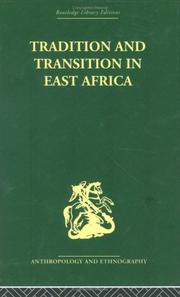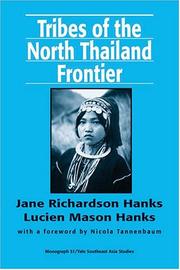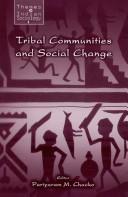| Listing 1 - 10 of 42 | << page >> |
Sort by
|
Book
ISBN: 0190943270 0190911441 Year: 2017 Publisher: New York, New York : Oxford University Press,
Abstract | Keywords | Export | Availability | Bookmark
 Loading...
Loading...Choose an application
- Reference Manager
- EndNote
- RefWorks (Direct export to RefWorks)
Tribes --- Tribes and tribal system --- Families --- Clans

ISBN: 1136529330 1315017253 9781136529337 9781315017259 9781136529405 1136529403 9781136529474 1136529470 0415329868 9780415329866 9781138861817 Year: 2004 Publisher: London ; New York : Routledge,
Abstract | Keywords | Export | Availability | Bookmark
 Loading...
Loading...Choose an application
- Reference Manager
- EndNote
- RefWorks (Direct export to RefWorks)
First published in 1969.
Divided into two parts, the first sections in the book examine the significance of the tribal factor in certain general contexts and discuss some of the particular backgrounds to contemporary transition in East Africa. There are essays on politics, economic development, language, law and education, together with a comparative look at European nationalism. In the second part, the grass-roots basis and development of the concept of the tribe are considered and its operation in social life in rural areas discussed.
The contributions come from a wide range of schol
Ethnology --- Tribes --- Tribes and tribal system --- Families --- Clans
Book
ISBN: 0710064268 Year: 1969 Publisher: London Routledge and Kegan Paul
Abstract | Keywords | Export | Availability | Bookmark
 Loading...
Loading...Choose an application
- Reference Manager
- EndNote
- RefWorks (Direct export to RefWorks)
Ethnology --- Tribes --- Anthropologie sociale et culturelle --- Tribes and tribal system --- Families --- Clans
Book
ISBN: 1317543475 1315728621 1317543483 1844657825 9781317543480 1908049839 9781908049834 9781315728629 9781317543466 9781317543473 Year: 2013 Publisher: Sheffield : Equinox,
Abstract | Keywords | Export | Availability | Bookmark
 Loading...
Loading...Choose an application
- Reference Manager
- EndNote
- RefWorks (Direct export to RefWorks)
Until the First World War, Near Eastern society was tribally organised. In the Levant and the Arabian peninsula, where the Ottoman empire was weak, large and powerful tribes such as the Anaze, Beni Sakhr and Shammar competed for control of the land, the people and the economy. This in-depth study explores the history, archaeology and anthropology of tribal society, economy and politics in the villages, towns and deserts of the Near East in the nineteenth century. Drawing on a wide range of historical accounts from travellers, adventurers and explorers as well as archaeological evidence, the book sheds new light on tribal life and tribal organisation as a driving force in Near Eastern society. While a straight comparison between ancient and more recent tribal communities must be treated with caution, the book shows how a better understanding of nineteenth-century tribal ethics and customs provides useful insights into the history and power relations of the more distant past and the underlying causes for the present conflicts of the region. The book is an important addition to new research on Bedouin life and culture and will be of interest to historians, archaeologists, anthropologists and scholars of the Near East.
Tribes --- Tribes and tribal system --- Families --- Clans --- Middle East --- Social conditions.
Book
ISBN: 9811634246 9811634238 Year: 2021 Publisher: Singapore : Springer,
Abstract | Keywords | Export | Availability | Bookmark
 Loading...
Loading...Choose an application
- Reference Manager
- EndNote
- RefWorks (Direct export to RefWorks)
Tribes --- History --- India --- Great Britain --- Colonies --- Administration --- Tribes and tribal system --- Families --- Clans
Book
ISBN: 935150400X 8132119657 9788132119654 9788132113478 8132113470 9353881358 Year: 2014 Publisher: New Delhi Thousand Oaks
Abstract | Keywords | Export | Availability | Bookmark
 Loading...
Loading...Choose an application
- Reference Manager
- EndNote
- RefWorks (Direct export to RefWorks)
Tribes --- Tribes and tribal system --- Families --- Clans --- History --- India, Northeastern --- Great Britain --- Northeast India --- Northeastern India --- Politics and government --- Colonies

ISBN: 0938692755 0938692763 Year: 2001 Publisher: New Haven Yale university. Southeast Asia studies
Abstract | Keywords | Export | Availability | Bookmark
 Loading...
Loading...Choose an application
- Reference Manager
- EndNote
- RefWorks (Direct export to RefWorks)
Ethnology --- Tribes. --- Indigenous peoples --- Anthropologie sociale et culturelle --- Tribus --- Autochtones --- Tribes --- Tribes and tribal system --- Families --- Clans --- Aboriginal peoples --- Aborigines --- Adivasis --- Indigenous populations --- Native peoples --- Native races

ISBN: 1282424866 9786612424861 8132103467 9788132103462 9781282424869 6612424869 0761933301 9780761933304 076193331X 9780761933311 8178294648 9788178294643 8178294656 9788178294650 Year: 2005 Publisher: New Delhi Thousand Oaks, Calif. Sage Publications
Abstract | Keywords | Export | Availability | Bookmark
 Loading...
Loading...Choose an application
- Reference Manager
- EndNote
- RefWorks (Direct export to RefWorks)
In almost all developing and developed societies, tribals are viewed as the 'other'-an anachronism or an object of curiosity. Initially marginalized by the creation of the boundaries of the nation-state, these indigenous peoples were further hedged in by colonialism and, then, by the indifferent or patronizing modern state. This volume brings together significant contributions by distinguished Indian and foreign scholars on the sociology of tribes, particularly those of India as also of Africa and Canada. It focuses on the social history of a cross-section of tribes in these three societies. T
Social change. --- Tribes --- Tribes. --- Tribes and tribal system --- Families --- Clans --- Change, Social --- Cultural change --- Cultural transformation --- Societal change --- Socio-cultural change --- Social history --- Social evolution --- India --- Social conditions
Book
ISBN: 0674060946 9780674060944 9780674059016 0674059018 0674263561 9780674263567 Year: 2011 Publisher: Cambridge, MA
Abstract | Keywords | Export | Availability | Bookmark
 Loading...
Loading...Choose an application
- Reference Manager
- EndNote
- RefWorks (Direct export to RefWorks)
"We began as savages, and savagery has served us well—it got us where we are. But how do our tribal impulses, still in place and in play, fit in the highly complex, civilized world we inhabit today? This question, raised by thinkers from Freud to Lévi-Strauss, is fully explored in this book by the acclaimed anthropologist Robin Fox. It takes up what he sees as the main—and urgent—task of evolutionary science: not so much to explain what we do, as to explain what we do at our peril.Ranging from incest and arranged marriage to poetry and myth to human rights and pop icons, Fox sets out to show how a variety of human behaviors reveal traces of their tribal roots, and how this evolutionary past limits our capacity for action. Among the questions he raises: How real is our notion of time? Is there a human “right” to vengeance? Are we democratic by nature? Are cultural studies and fascism cousins under the skin? Is evolutionary history coming to an end—or just getting more interesting? In his famously informative and entertaining fashion, drawing links from Volkswagens to Bartók to Woody Guthrie, from Swinburne to Seinfeld, Fox traces our ongoing struggle to maintain open societies in the face of profoundly tribal human needs—needs which, paradoxically, hold the key to our survival."--Provided by publisher.
Tribes --- Civilization. --- Barbarism --- Civilisation --- Auxiliary sciences of history --- Culture --- World Decade for Cultural Development, 1988-1997 --- Tribes and tribal system --- Families --- Clans --- Philosophy.
Book
ISBN: 0773500677 9780773500679 Year: 1969 Publisher: Montreal, Que. McGill-Queen's University Press
Abstract | Keywords | Export | Availability | Bookmark
 Loading...
Loading...Choose an application
- Reference Manager
- EndNote
- RefWorks (Direct export to RefWorks)
Political systems --- Sociology of the developing countries --- Sociology of culture --- East Africa --- Tribes --- Africa, East --- Politics and government. --- -Tribes and tribal system --- Families --- Clans --- -Africa, British East --- British East Africa --- Politics and government --- -Africa, East --- -Politics and government --- Tribes and tribal system --- Tribes - Africa, East. --- Africa, East - Politics and government.
| Listing 1 - 10 of 42 | << page >> |
Sort by
|

 Search
Search Feedback
Feedback About UniCat
About UniCat  Help
Help News
News